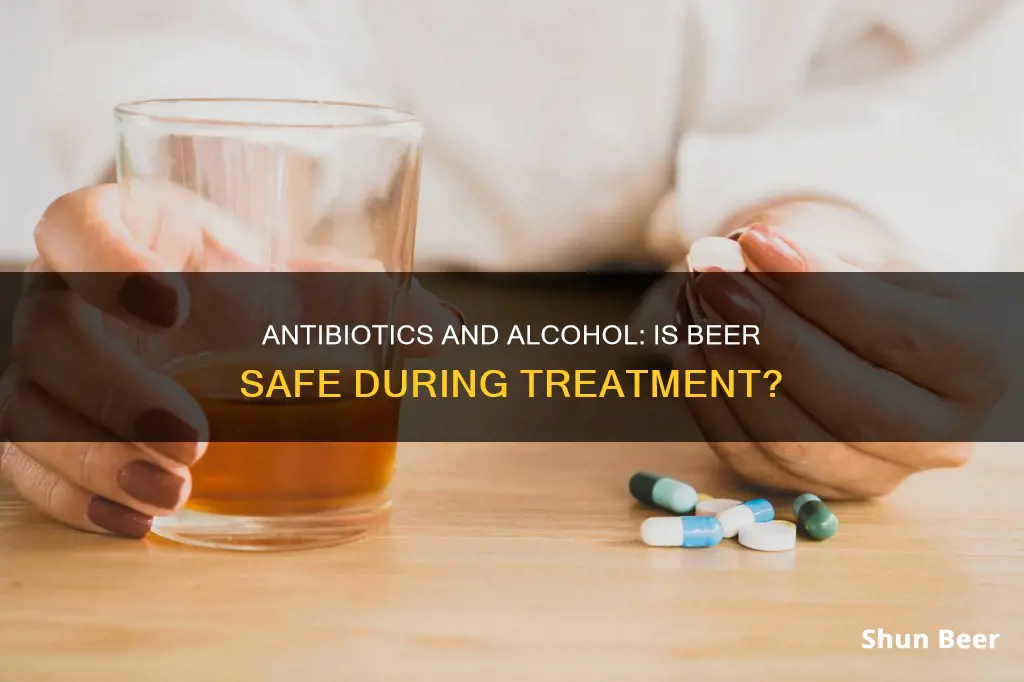
Drinking alcohol while on antibiotics is generally not recommended, as it can cause harmful interactions and negative effects on the immune system. Alcohol can amplify the side effects of antibiotics, such as nausea, vomiting, and digestive issues, and even lead to severe fatigue, headache, dizziness, and potential liver damage. Additionally, alcohol can interfere with the body's ability to absorb antibiotics, reducing their effectiveness. It is best to consult a doctor or pharmacist before mixing alcohol with any medication, as certain antibiotics require refraining from alcohol consumption completely.
| Characteristics | Values |
|---|---|
| Should you drink beer while on antibiotic infusion? | No, it is not recommended to drink alcohol while taking antibiotics due to the harmful interactions that can occur, as well as the negative effects that alcohol has on the immune system. |
| What happens if you drink alcohol while taking antibiotics? | You may experience a variety of minor side effects, such as increased drowsiness, dizziness, digestive issues, dehydration, upset stomach, interrupted sleep, lowered immune response, and hindered healing. |
| Are there any specific antibiotics that should not be taken with alcohol? | Yes, certain antibiotics should never be mixed with alcohol, including Metronidazole, Tinidazole, Cefoperazone, Cefotetan, Ketoconazole, Isoniazid, Linezolid, Sulfamethoxazole, and Trimethoprim. |
| How long after taking antibiotics can you drink alcohol? | It is recommended to wait until you have completed your course of antibiotics before consuming alcohol. In some cases, you may need to wait for 48-72 hours after finishing your antibiotics. Always refer to the warning label and consult your doctor or pharmacist. |
What You'll Learn

Beer and antibiotic infusion side effects
Mixing beer and antibiotics can have several side effects, and it is generally advised to avoid drinking alcohol while on antibiotic treatment. Beer, like other alcoholic drinks, can cause side effects such as digestive problems, including stomach pain, diarrhoea, and ulcers. It can also disrupt sleep patterns and increase blood sugar levels, which can interfere with the healing process.
Negative alcohol-antibiotic reaction
Drinking beer while taking antibiotics can lead to a negative alcohol-antibiotic reaction, which may include:
- Flushing (reddening and warming of the skin)
- Stomach cramps
- Vomiting
- Difficulty breathing
Increased side effects
Both alcohol and antibiotics can cause side effects, and consuming beer while on antibiotics can increase the risk of experiencing these harmful effects. Antibiotics can cause side effects such as an upset stomach, nausea, and diarrhoea, and drinking beer can amplify these effects and cause additional ones, including:
- Vomiting
- Dizziness
- Drowsiness
- Headaches
- Seizures
Organ damage
Mixing beer and antibiotics can also damage vital organs, including the liver and kidneys. Antibiotics can overburden the kidneys, and alcohol can exacerbate this issue. Additionally, excessive alcohol consumption is well-known to cause liver damage, and certain antibiotics can also impact the liver, leading to potential liver problems or even liver failure when mixed with alcohol.
Interference with healing
Drinking beer while on antibiotics can interfere with the healing process by disrupting sleep and hydration, which are critical components of recovering from an infection. Beer can also stop the body from absorbing vital nutrients, increasing blood sugar levels and reducing energy levels, which can hinder the body's ability to heal.
In summary, it is best to avoid drinking beer or any other alcoholic beverage while on antibiotic treatment to minimise the risk of side effects and allow for optimal healing.
Exploring Beer Drinking on the Las Vegas Strip
You may want to see also

Beer and immune system interference
The Effects of Alcohol on the Immune System
It is well-known that alcohol abuse is detrimental to health, but even moderate alcohol consumption can have complex effects on the body's immune system. Alcohol can directly suppress a wide range of immune responses, and heavy drinking is associated with an increased risk of infectious diseases. However, some studies suggest that light to moderate consumption of polyphenol-rich alcoholic beverages like beer may have health benefits, including a positive impact on the immune system.
The Effects of Antibiotics on the Immune System
Antibiotics are powerful medications that destroy or slow down the growth of harmful bacteria in the body. They are often prescribed to treat bacterial infections, such as urinary tract infections, sexually transmitted diseases, and skin infections like acne. While antibiotics work to fight off harmful bacteria, they can also disrupt the balance of good bacteria in the body, which can lead to side effects like an upset stomach, nausea, and diarrhea.
The Combined Effects of Beer and Antibiotics on the Immune System
When it comes to drinking beer while on antibiotic infusion, it is important to consider the potential risks. Alcohol can interfere with the body's ability to recover from an infection by disrupting sleep patterns and affecting the absorption of vital nutrients. Additionally, both alcohol and antibiotics can hinder cognitive function, concentration, and coordination.
Furthermore, drinking beer while taking certain antibiotics can lead to severe side effects, including severe fatigue, headaches, dizziness, anxiety, chest pain, and heart palpitations. It can also worsen digestive issues, causing severe diarrhea, vomiting, and intense stomach pain. In some cases, mixing alcohol with antibiotics can damage vital organs, including the liver and kidneys.
Recommendations
To ensure optimal recovery from an infection and avoid potential complications, it is generally recommended to avoid consuming alcohol while taking antibiotics. It is best to wait until you have completed your course of antibiotics and given your body adequate rest and nutrition before enjoying a beer. If you have any concerns or questions about drinking beer while on antibiotic infusion, it is always best to consult with your doctor or pharmacist.
Drinking Beer in Public: NYC's Laws and Where to Enjoy
You may want to see also

Beer and liver damage
Drinking alcohol while on antibiotics is not recommended due to the harmful interactions and side effects that can occur. Alcohol can directly inhibit the effectiveness of antibiotics and increase the risk of adverse effects, such as digestive problems, nausea, vomiting, dizziness, drowsiness, headaches, and seizures. It is best to wait until you have completed your course of antibiotics before consuming alcohol.
Now, let's focus on the topic of beer and liver damage:
Excessive alcohol consumption, including beer, is one of the leading causes of liver damage, which can lead to liver disease. The liver is responsible for breaking down potentially toxic substances, including alcohol. When you drink more alcohol than your liver can effectively process, it can lead to increased fat accumulation in the liver, inflammation, and the formation of scar tissue in the liver. This can impair the liver's ability to function normally.
The early stages of alcohol-related liver disease often show no noticeable symptoms, but as the condition progresses, signs may include:
- Pain or discomfort in the upper right side of the abdomen, where the liver is located
- Fatigue
- Unexplained weight loss
- Jaundice (yellowing of the skin and eyes)
- Nausea and vomiting
- Abdominal pain and tenderness
If left untreated, alcohol-related liver disease can progress to alcoholic hepatitis, which can be life-threatening, and eventually to alcoholic cirrhosis, a permanent scarring of the liver that cannot be reversed.
It is important to note that the risk of developing liver disease depends on the amount of alcohol consumed and the duration of consumption. Abstaining from alcohol or drinking in moderation (up to 1 drink per day for women and up to 2 drinks per day for men) can help lower the risk of liver damage.
If you notice any signs or symptoms of liver damage, it is important to consult a doctor or healthcare professional for further evaluation and guidance.
Beer and Bowel Movements: The Loose Stool Link
You may want to see also

Beer and dehydration
Beer is mostly water, with alcohol content varying from 0% to over 12%. While alcohol is known to be a diuretic, the water content in beer means that beers with very low alcohol percentages won't dehydrate you. In fact, you may even break even or be slightly hydrated.
However, alcohol suppresses the production of the anti-diuretic hormone (ADH), which helps the body maintain sodium balance. With less ADH, the kidneys produce more urine, leading to increased urination and potential dehydration. This effect is amplified when consuming higher-alcohol beers.
Additionally, alcohol can negatively impact your body's ability to recover from an infection, as it disrupts sleep patterns and interferes with the absorption of vital nutrients.
To avoid dehydration and potential negative side effects, it is generally recommended to avoid alcohol while taking antibiotics and to ensure adequate rest and nutrition during the recovery process.
Beer and Wine: Mixing, Matching, and Drinking Safely
You may want to see also

Beer and sleep disruption
Drinking alcohol, including beer, before bed can lead to disrupted sleep patterns and overall low-quality sleep. While alcohol is known to help people fall asleep faster, these effects quickly wear off as the body tries to eliminate the alcohol from the system.
According to the National Sleep Foundation, the production of adenosine, a chemical in the brain that acts as a sleep-inducer, increases while drinking alcohol, allowing people to fall asleep quickly. However, this chemical quickly subsides, making it more likely for a person to wake up throughout the night. Additionally, alcohol inhibits REM sleep, often considered the most mentally restorative phase of sleep.
Research suggests that alcohol can negatively impact sleep quality, regardless of whether consumption is light, moderate, or heavy. A 2018 study found that low alcohol intake reduced sleep quality by 9.3%, moderate alcohol intake by 24%, and heavy alcohol intake by nearly 40%. The study also showed that alcohol affected men and women similarly and that younger people were more affected than older adults.
When it comes to drinking beer while on antibiotic infusion, it is generally recommended to avoid consuming alcohol while taking antibiotics due to the potential for harmful interactions and negative effects on the immune system. Alcohol can increase the risk of experiencing certain side effects from antibiotics and can interfere with the body's ability to recover from an infection by disrupting sleep and hydration, which are critical components of the healing process. Therefore, it is advisable to refrain from drinking beer or any other alcoholic beverage while on antibiotic infusion and instead focus on getting adequate rest and nutrition to support the recovery process.
In conclusion, drinking beer, even in moderate amounts, can disrupt sleep patterns and reduce sleep quality. It is best to avoid consuming alcohol while on antibiotic infusion to prevent potential health risks and give the body the best chance to heal and recover from an infection.
Beer Drinking and the Mystery of Missing Burps
You may want to see also
Frequently asked questions
It is not recommended to drink beer or any other alcoholic beverage while on antibiotic infusion due to the harmful interactions that can occur. Alcohol can interfere with the effectiveness of antibiotics and increase the risk of side effects such as nausea, vomiting, and digestive issues. It can also negatively impact your immune system and hinder your recovery. Therefore, it is best to avoid alcohol during your antibiotic treatment and allow your body to heal.
Drinking alcohol while taking antibiotics can increase the risk of various side effects, including nausea, vomiting, digestive issues, drowsiness, dizziness, headaches, and liver damage. Additionally, alcohol can interfere with the absorption and effectiveness of certain antibiotics. It is important to note that the specific side effects may vary depending on the type of antibiotic and the amount of alcohol consumed.
Yes, there are several tasty alternatives to beer and other alcoholic beverages that you can enjoy while on antibiotics. You can opt for non-alcoholic drinks, mocktails, or focus on beverages that boost your hydration and help you stay energised during your recovery. These alternatives will not interfere with your antibiotic treatment and can provide a refreshing option for social events or when you want to unwind.







